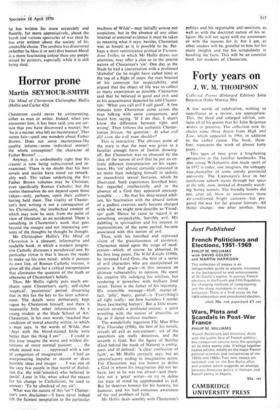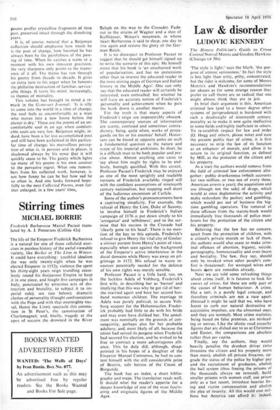Forty years on
J. W. M. THOMPSON
Collected Poems (Enlarged Edition) John Betjeman (John Murray 30s)
A few words of celebration, nothing so superfluous as a review, are appropriate. This, the third and enlarged edition, con- tains all of his poems that Sir John Betjeman wishes to preserve. The collection now in- cludes some three dozen from High and Low, which appeared in 1966, in addition to the earlier canon. The book, there- fore. represents the work of almost forty years.
This span of time gives a lengthening perspective to the familiar landmarks. The dim young Wykehamist don made sport of in 1932 is today, one imagines, the unhappy vice.chancellor of some unruly provincial university. The Lieutenant's love in her coniferous suburb stares through her specs at the telly. now, instead of dreamily watch- ing Surrey sunsets. The friendly bombs did not, after all, blow to smithereens those air-conditioned bright canteens—but pre- pared the way for far greater horrors. All things change: one after another, these
poems proffer crystalline fragments of time past, preserved intact through the dissolving years.
It is, of course, natural that a Betjeman collection should emphasise how much he is the poet of change, how haunted he has always been by the painfulness of the pass- ing of time. When he catches a scene or a moment with his own innocent precision, the very sharpness only points to the transi- ence of it all. The theme has run through his poetry from decade to decade. It gives an extra turn to his anger when he laments the philistine destruction of familiar, service- able things. It turns his mind, increasingly, to themes of mortality.
This volume has brought to mind a re- mark in the Goncourt Journal: 'It is silly to come into the world in a time of change; the soul feels as uncomfortable as a man who moves into a new house before the plaster is dry.' These are the poems of an un- comfortable soul in an age when comfort- able souls are very few. Betjeman might, in- deed, have been a far less accomplished poet and still have been acclaimed in this particu- lar time of change; his marvellous percep- tion of what is, in persons and in places, is shadowed always by his sense that it will quickly cease to be. The gaiety which lights up many of his poems is his own counter to the pervasive regret. What one remem- bers from his collected work, however, is not how funny he can be but how sad he so often is. And one looks forward hope- fully to the next Collected Poems, even fur- ther enlarged, in a few years' time,







































 Previous page
Previous page